In the Tesseract of Ours: Love, Death, and 'Interstellar'
A personal act of remembrance, of rebellion against the inexorable tide of time.
On Feb 14th, at the start of our weekly standup, my manager, perhaps inspired by a sudden bout of whimsy or a misguided sense of team-building — asked us about our fondest Valentine's memory — only to send a ripple of awkward silence through the room: It turned out that more than half of the people in the meeting were one of the following: recently single, perpetually single, divorced.
Seeing that there was perhaps no winning in hyping up modern romance, when my turn arrived, I found myself speaking of a day spent with the man whose love for me is without parallel in this world — my dad. Yes, that's right, my dad.
It was one of those rare, simple days where everything just felt right - sunny, warm, serene. We were just chilling by the sea at a beach back in China, which was a big deal because I've been living abroad for many years. My dad took me to a restaurant for seafood skewers and then we strolled down this quiet beach strip towards a lighthouse.
Along the way, dad was unusually excited. He behaved like a big kid, all wide-eyed, pointing out the oddities in every little tree and seashell as if seeing it all for the first time or perhaps the last…I couldn’t help but laughing at the way he goofed off, which made his signature outfit stand out — typically featuring casually mismatched clothes defying all fashion norms. In this case, he was wearing a cowboy hat and crumpled dress pants - too formal for the sand, too earnest for ridicule.
As I watched my dad explore with the wonder of a child, I remember feeling this bittersweet tug, washed over by a strong sense of “Nowstalgia”, hearing the whispering of these moments slipping through my hand, fleeting, finite.
As a usual ritual, I captured these moments on camera, not expecting that in the miles and years away from that day I hadn’t been able to see him since, these photographs would become talismans against time, against the long, lone nights of lock-down, against the silence between visa status updates, the distance that stretches between unanswered existential queries. They solidified as proof that happiness, once felt, leaves an indelible mark no one can take away from me.
After the meeting, one of my coworkers came up to me. He’s a middle-aged guy with an eloquent speaking style that I always thought could narrate documentaries. This time, his voice was soft and words simple. He said his wife had always been a romantic woman. Since she moved on, he’s been spending Valentines with his daughter. He said he’d usually take his daughter out on this day to a restaurant she likes. My story made him see that he could be the dad in my beach day, and he wanted to thank me for that.
I recently re-watched Christopher Nolan’s film “Interstellar”. Ten years ago, my initial viewing left me stunned by its audio-visual grandeur and scientific imagination, yet uninspired by the emotional core underneath the shell of hard science. Back then, like many people, I felt indifferent about the film’s central premise of love as the transcending force against time and space. If anything, it came at the cost of the film’s metaphysical depth.
Operating like a sort of deus ex-machina, love was what propelled Cooper to find his path inside the black hole; love was what convinced Murphy that the anomaly of the watch was nothing but a signal that her father was out there trying to reach her. How convenient it was, I pondered back then, for Nolan to designate love as a mystical force of a higher fifth dimension beyond quantifiable comprehension - that solved all problems for everyone involved.
Yet, with each passing year away from home, I find myself gravitating closer to this notion of love. A decade on, Nolan’s universe is beginning to look like a mirror held up to the emotional odyssey I have treaded.
The film’s original cerebral stimulation has waned in comparison to an emotional journey’s increasingly richer taste, paid for with the non-negotiable price of separation, of missed connections, of trials and betrayals in a world where love and desire often wear the same mask.
To me, love’s transcendent force, once kitschy and abstract, is now intimate, now necessary.
When I see Murphy coming to the realization that her father was her “ghost” and that she was always being watched over by him, I think of how my dad’s words — "Our hearts are always connected, no matter where you are" — echo through the years.
They are not just goodbye but a promise;
A mantra for those of us adrift in the diaspora, navigating the spaces between homeland and nomad-land, between foreign and mother tongues;
A reminder that even when the orbits of society sprawl too vast and fast, even when the mathematics of the game seem too cold and indifferent, this connection between my dad and me, remains unbroken.
Did you know that Nolan’s working title for Interstellar was “Flora’s Letters”? Flora is the name of Nolan’s youngest daughter.
This hidden footnote offers me a stolen glimpse into Nolan's personal universe, where epic narrative threads are stitched into the fabric of finer lines of tender intimacy. It consists in a revelation that must be experienced instead of reasoned. In this softer light, I discover the theme of Interstellar running in parallel to the lived narrative of my grandfather’s life.
As a captain and fighter pilot, grandfather soared not amidst the galaxies, but the war-torn skies of mid-20th-century China. Growing up, I used to see grandfather more myth than man, a devout communist carved from the revolutionary tales of a Maoist China caught in the throes of becoming.
Yet, in this newfound light, I see not a war hero's aerial combats and later personal battles against illnesses, but a father and grandfather’s steadfast trek through the challenges of his time, with the simple hope of coming home to his loved ones.
I still clearly remember a video call we had in the last year of grandfather’s life. As if time itself had accelerated, grandpa emerged from the depths of a coma that seemed to claim a bigger piece of him with each passing second. There, amidst the sterile hum of hospital life, where faces of my cousins became strangers and familiar voices faded into the background of his world, my dad pressed the phone close to grandfather’s ear, "Shout at your grandfather" he urged me on the other end. And I did, bracing for the echo of silence.
But then, in defiance of expectation that was too cinematic to be true, grandpa’s whisper, frayed yet unmistakable, pierced the silence, "Anqi, stay."
In that whisper, the universe contracted to a single point of convergence, echoing the "stay" in Cooper’s code and Murphy’s plea, each one a reflection of the other.
Cooper has a neurotic daughter consumed by her life-long fixation on reaching her father, and a steady son who goes more with the flow. Both are bound by love for their father, yet it's the daughter's relentless love, misunderstood love, pain-ridden love that makes it possible for Cooper’s message to carve through the tesseract to find her, standing against the inexorable drift towards entropy.
Yet, grandfather's plea for me to "stay," didn't pull me back in time. It became not a comfort, but a specter of what I’ve left behind, echoing the cost of my choices, much like Cooper's, and that of countless other nomads in our world who bet their best years, their best efforts on tomorrow’s uncertain frontiers instead of yesterday’s warm bonds. A dedicated pursuit of obsessions at best, or a natural instinct of cruelty at worst. This, perhaps, is the shared emotional debt every explorer and wanderer accrue in our quest for the beyond, adrift in the vast, echoing expanse of our own interstellar voids.
A few months after that call with grandfather, where once three voices filled the phone conversations, we dwindled to two.
As usual, I found my quest for understanding and solace reaching for what has already slipped through my fingers, as I asked my father, "Was it worth it? All the effort, the sacrifices from everyone throughout the years, knowing it would not change the outcome?" My reasoned cost-benefit analysis seemed inadequate here. Dad’s answer was clear and simple:
"We all love your grandfather. It can't be calculated like that.”
Ken Liu, prolific science-fiction author, once wrote in his story collection The Paper Menagerie, “At the end of all rationality, there is simply the need to decide and the faith to live through, to endure.”
My dad’s affirmation, simple in its delivery, carried the weight of countless unspoken decisions of devotion—the same decision made over and over, in each push of the wheelchair through silent hallways, in every careful wash, in every spoon-fed meal in hushed companionship—with a sense of near-religious endurance that I stepped out of and could only imagine from the stories told.
It is in this context of personal absence that I find reassurance in Interstellar’s message—what's lost remains so, rightfully unredeemed by any notion of easy comfort. Old Murphy's farewell to her father in her deathbed, "Parents shouldn't have to watch their children die," followed by a shift in her gaze from the father she's yearned for across decades to her children and grandchildren, encapsulates this sentiment. At the end of the day, what awaits Cooper isn’t a happily-ever-after resolution or recovery of what he had to let go of, but rather an undeniable acceptance for the continuum of life that was and is moving forward all in his absence.
And so, time keeps rolling, carrying us in its current. We find ourselves mere footnotes in its march, stepping aside as new chapters are written with, or more often, without us—cries of newborns we didn't hear, the slow change in our folks' faces we didn't see, friends' laughter at weddings we missed, and the quiet fade of relationships we couldn't mend.
In acknowledging the cycle of life that pulses on without us, however, there’s not only a mix of lamentation and yearning tugging at us, but also a touch of peace and strength guiding us, found in the whispers of joy and sorrow passed down in the stories we inherit, not firsthand, but through the hearts of those who have lived on our behalf…
I remember, as grandfather’s world faded, his vision blurred, sounds muffled, and movements slowed, all except for his sense of taste. It remained, an anchor of earthbound joy, far removed from his youthful conquests in the skies. In a phone call, my dad recounted his effort to bring that joy to my grandfather's lips in his twilight moment: a spoonful of mango juice to bridge the gap left by the surgery's restrictions on solid food. The moment the juice touched grandfather’s tongue, he let out a soft yet vibrant laughter, breaking through the sterile stillness of the hospital ward, resounding with a sense of courageous clarity:
"Tell Anqi, grandpa is going happily! Sour and sweet, on my way to see Chairman Mao!"
Through my dad’s eyes, I could visualize, in that moment, my grandfather standing at a threshold, glancing at the closing of circles:
The good fights have been fought, the promises kept, and now grandfather was ready to embark on his final journey, ready to return to the spiritual ideals that had guided him at the very start.
As I am writing this, I find myself, too, standing at a threshold, where night bleeds into dawn, San Francisco stirs beneath a gentle drizzle, reminiscent of so many February mornings past. Nearby, the Cathedral of Saint Mary of the Assumption looms through the distant hum of engines, its monumental shape cutting through the gray sky, a testament to our aspirations for the infinite, for the ethereal.
In this solitude, the act of writing has become an act of constructing, the storyteller has become part of the story, the observer, observed - beneath the cathedral’s imposing watch over our struggles to reach beyond ourselves, I see this essay becoming a living tesseract laid bare: A multidimensional space for my own act of defiance, my own refutation of time—
To remember, to love.

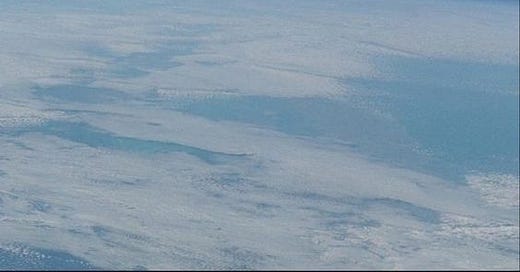



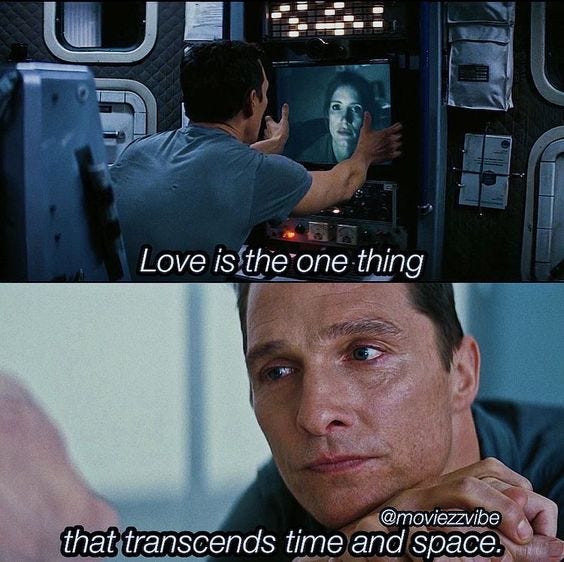

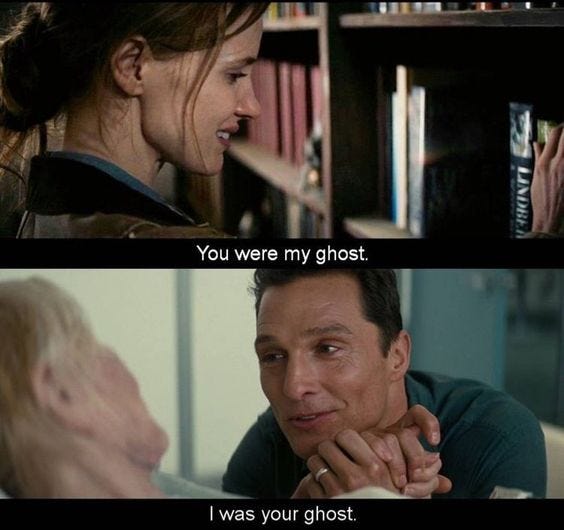
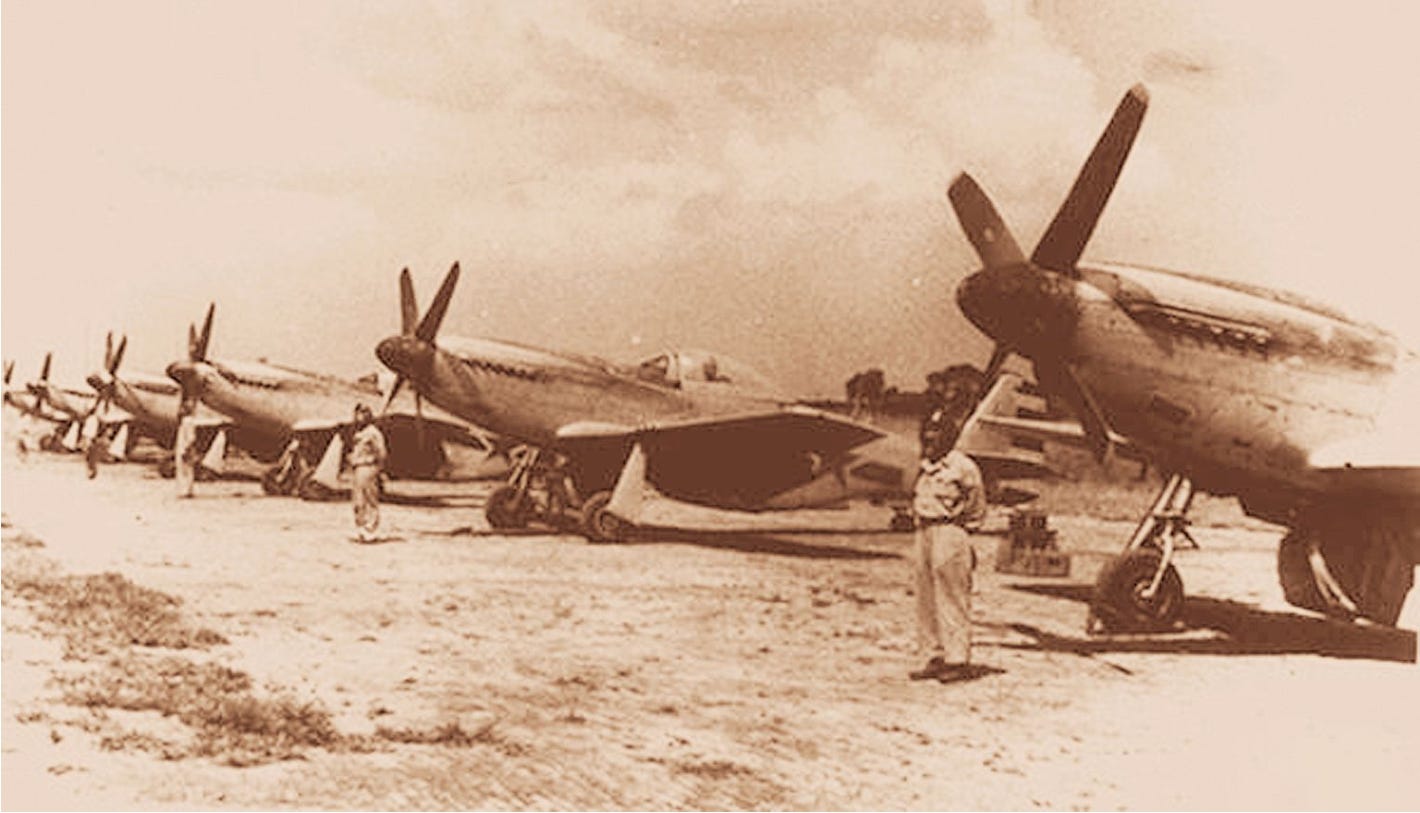

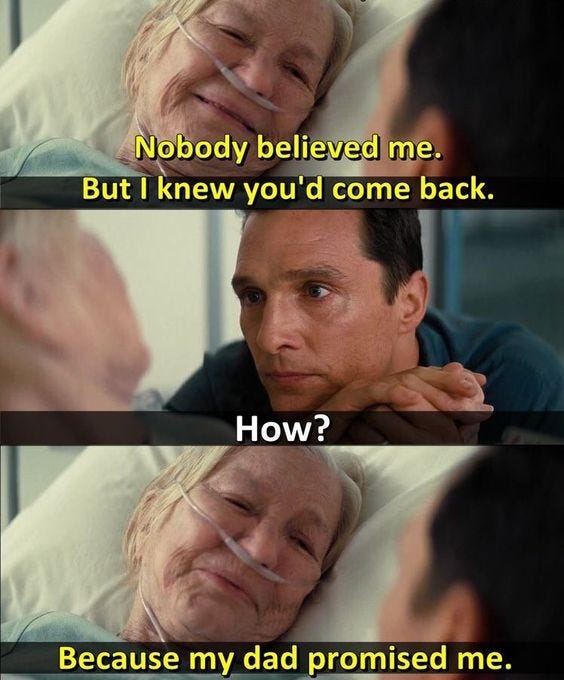
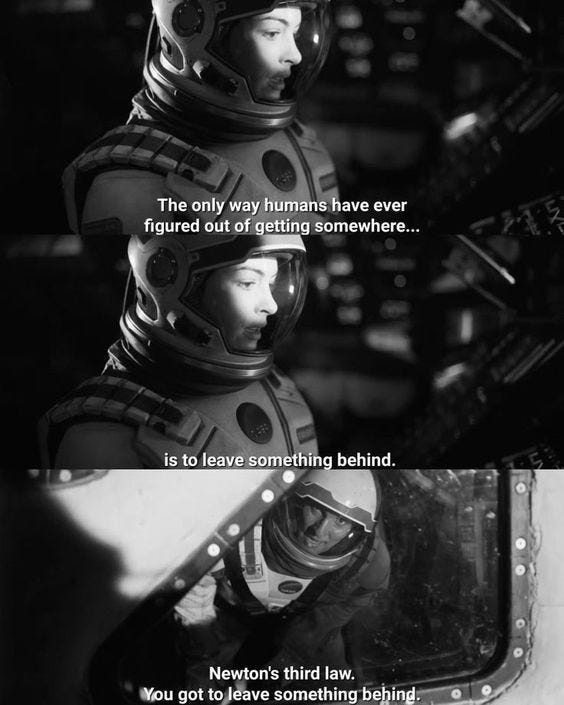
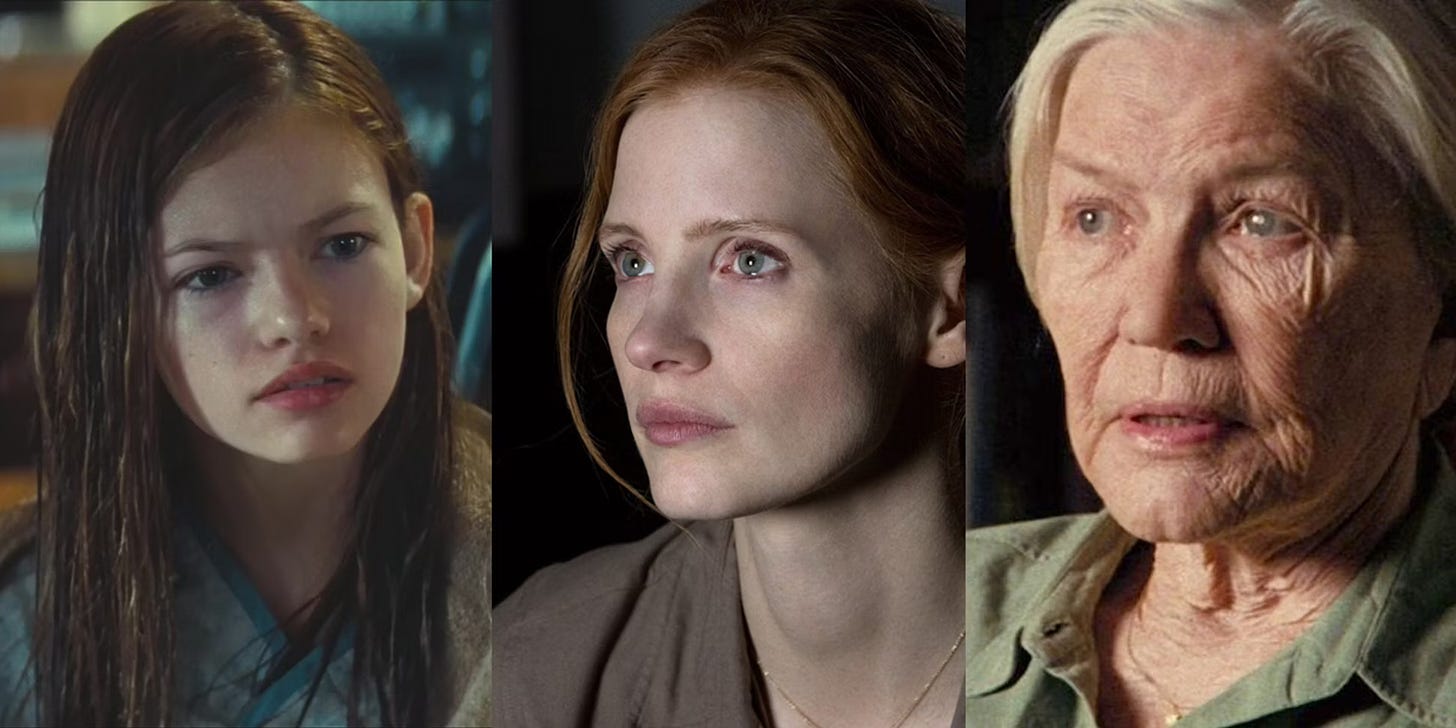
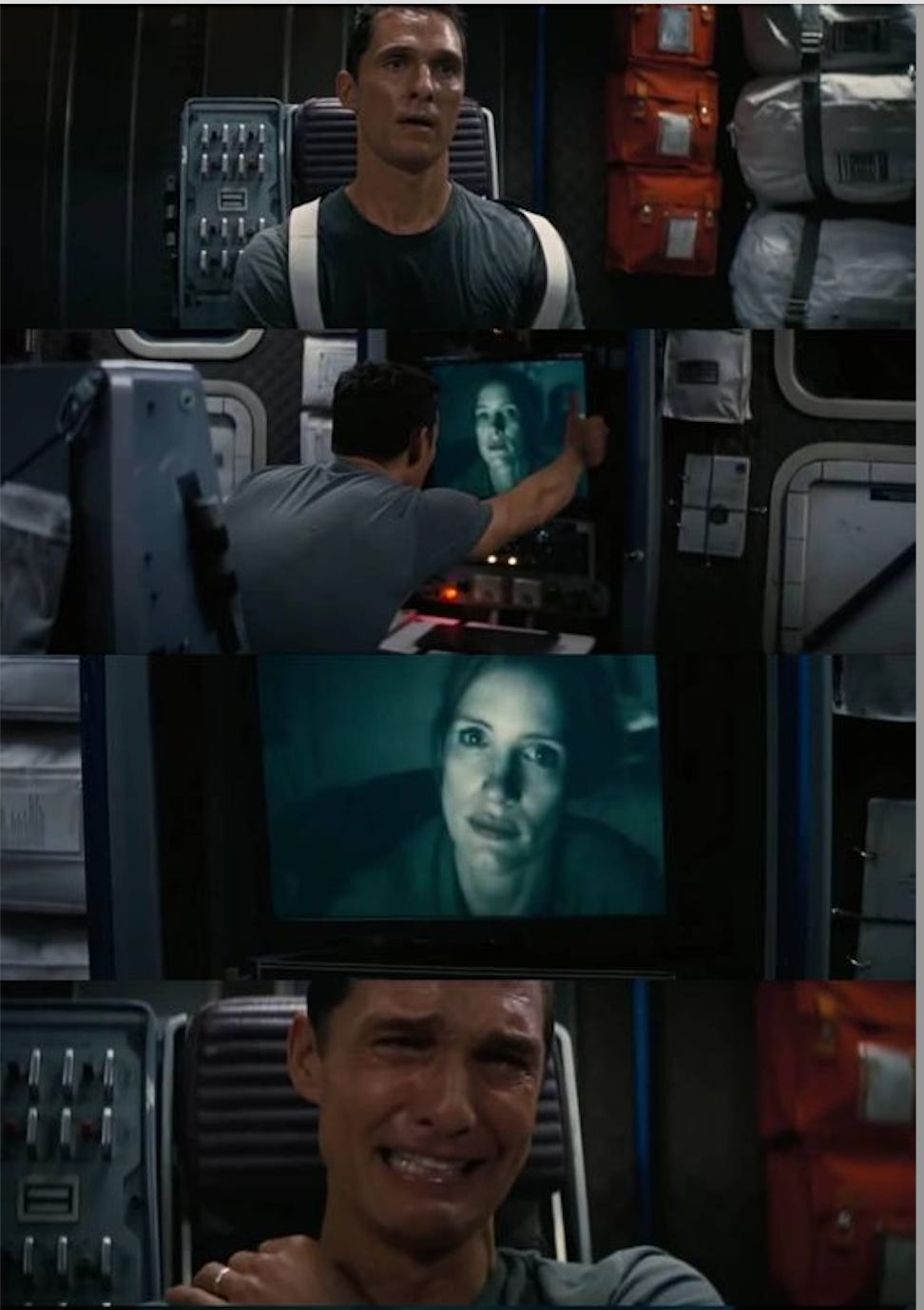
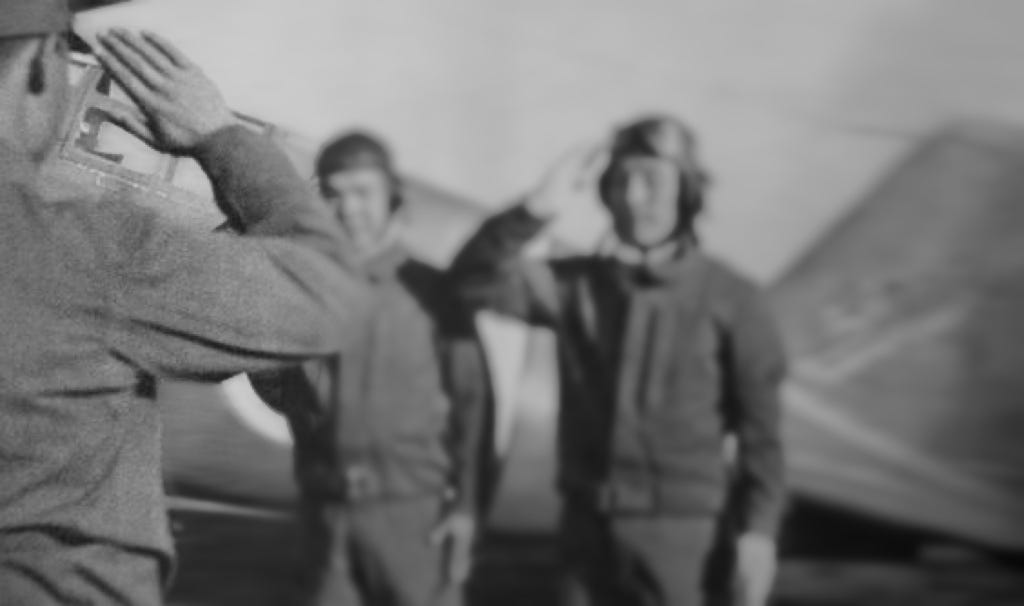
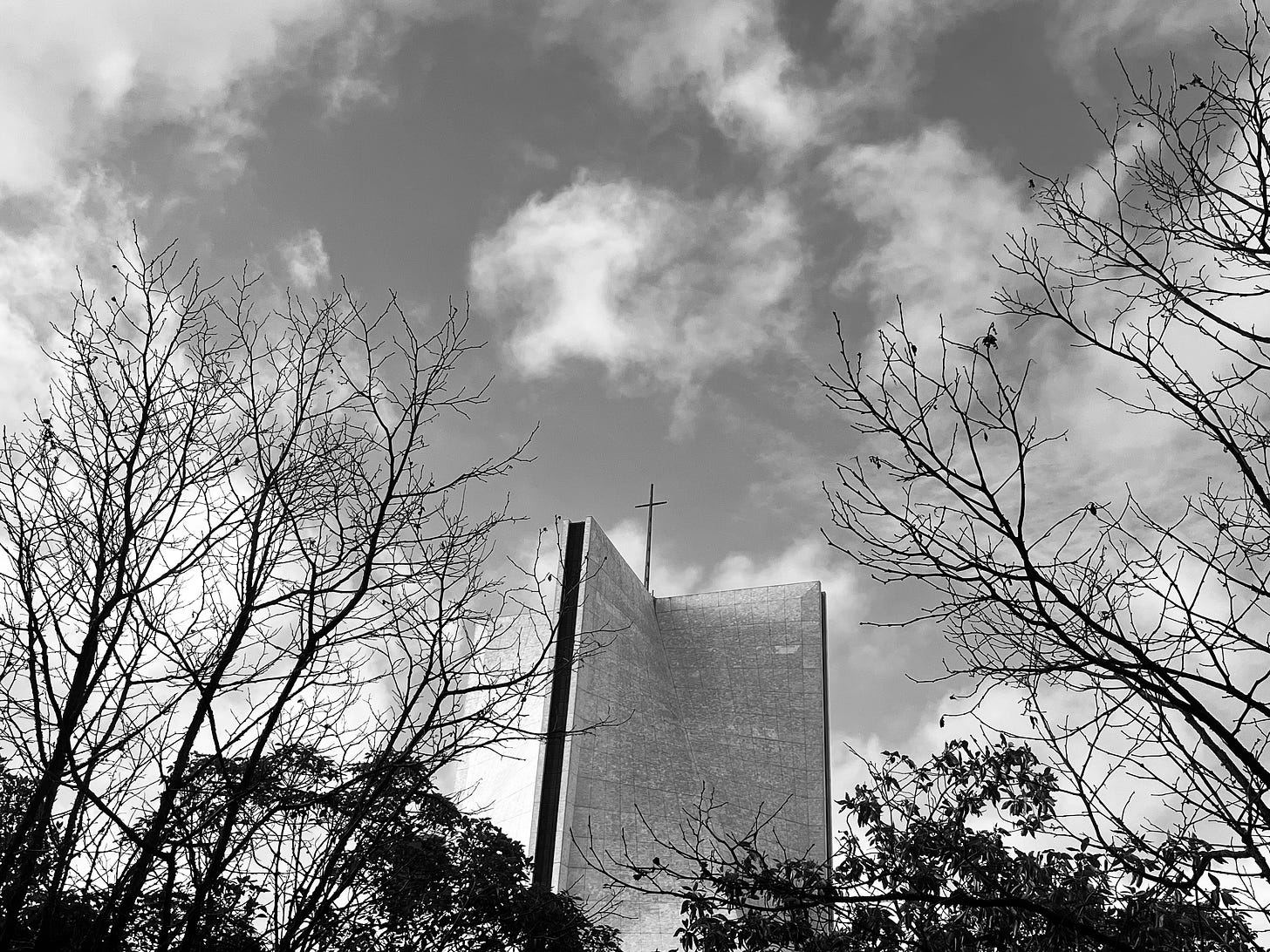
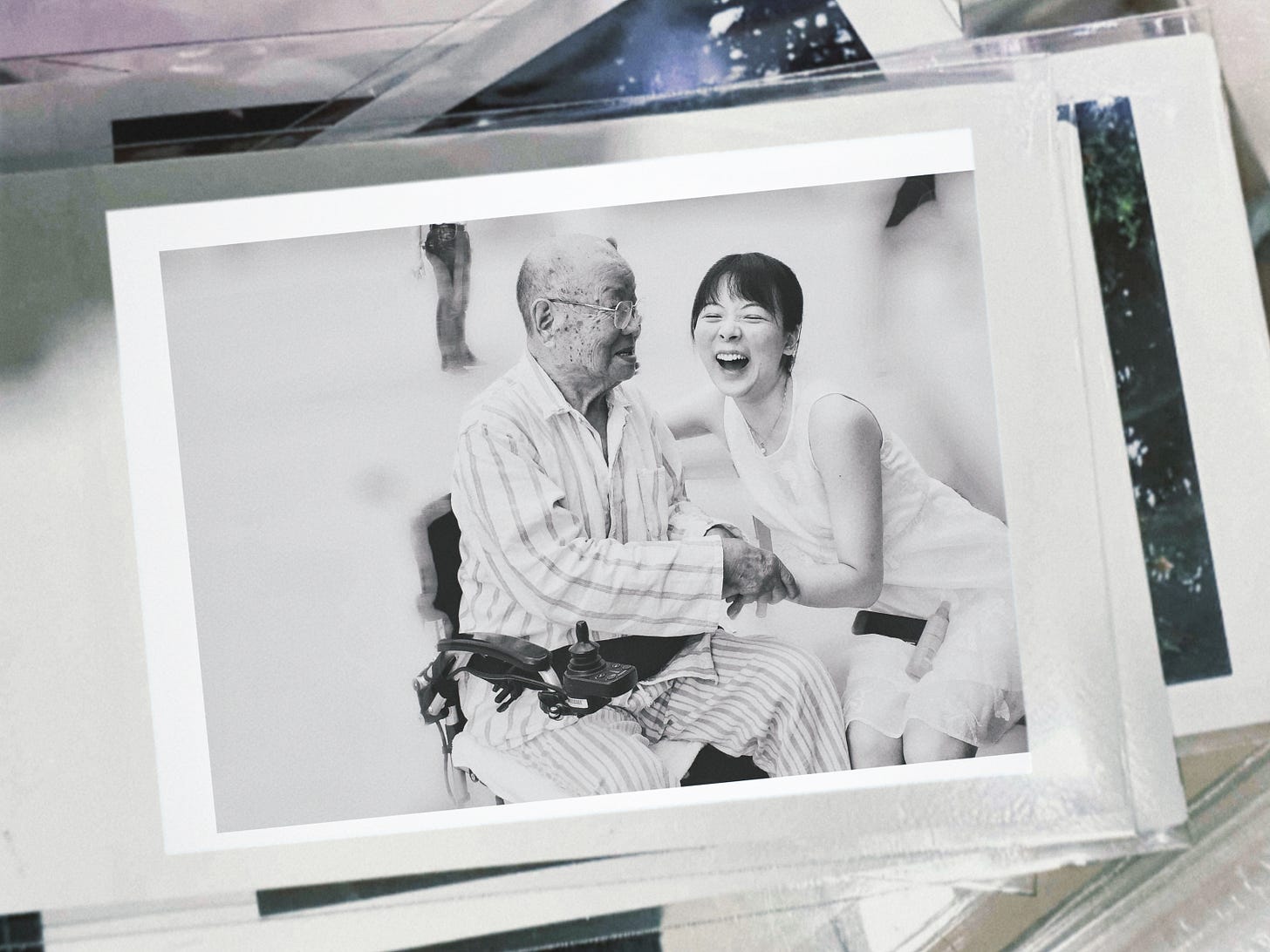

As cliche as it sounds, love does transcend time and space. We only experience this personally, especially when facing mortality, though we should remind ourselves now and then. Love and devotion cannot be calculated, while letting go also requires immeasurable selflessness.
this hits hard. relatable. indeed I had felt that before that love transcends time, hearts are connected no matter where we are.